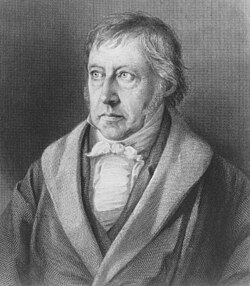This article has multiple issues. Please help improve it or discuss these issues on the talk page . (Learn how and when to remove these messages)
|
Historicism is an approach in the study of phenomena, particularly social and cultural practices, including ideas and beliefs, which emphasizes understanding these phenomena through the historical processes by which they developed. The concept is widely applied in fields such as philosophy, anthropology, and sociology.
Contents
- History of the term
- Variants
- Hegelian
- Anthropological
- New Historicism
- Modern Historicism
- Christian Historicism
- Critics
- Marxism
- Karl Popper
- Leo Strauss
- See also
- References
- Further reading
- External links
This historical approach to explanation differs from and complements the approach known as functionalism, which seeks to explain a phenomenon, such as for example a social form, by providing reasoned arguments about how that social form fulfills some function in the structure of a society. In contrast, rather than taking the phenomenon as a given and then seeking to provide a justification for it from reasoned principles, the historical approach asks "Where did this come from?" and "What factors led up to its creation?"; that is, historical explanations often place a greater emphasis on the role of process and contingency.
In philosophy, historicism is defined as the view that an object can be fully understood only in terms of its historical development, that its values can be explained by tracing their origins, and that its nature is comprehensively revealed through its evolutionary course. This perspective does not address critiques related to the historical fallacy. [1]
The term historism is an English translation of the German Historismus, but its usage has declined over time in favor of "historicism." For example, James Mark Baldwin’s 1918 Dictionary of Philosophy and Psychology includes the entry "historism" but omits "historicism," whereas Dagobert D. Runes’ 1942 Dictionary of Philosophy emphasizes "historicism." In contemporary usage, historicism is employed to describe approaches that integrate both German and Italian (storicismo) traditions and that focus on the explanation of historical processes. [2]
Mundane historicism refers to the view that examining an idea or individual within its historical context yields more accurate and comprehensive results, combining empirical observations with conceptual considerations. Methodological historicism argues that the social sciences and the natural sciences require different methods due to the distinct nature of their subject matters, and it evaluates the non-experimental character of history within this framework. Popperian historicism grounds the search for general laws of history in both the examination of historical records and abstract theoretical arguments; Hegel’s philosophy of history, based on a dialectical process, is often cited as a classical example of this approach. Epistemic historicism draws on historical and anthropological research to suggest that modes of reasoning and conceptions of rationality change over time; Ian Hacking adopts this historical perspective, while Hilary Putnam argues that attempts to formalize reasoning—such as Carnap’s project of inductive logic—have been unsuccessful and maintains that rationality is closely tied to value judgments. [3]
Historicism is often used to help contextualize theories and narratives, and may be a useful tool to help understand how social and cultural phenomena came to be.
The historicist approach differs from individualist theories of knowledge such as strict empiricism and rationalism, which does not take into account traditions. Historicism can be reductionist, often tends to be, and is usually contrasted with theories that posit that historical changes occur entirely at random.
David Summers, building on the work of E. H. Gombrich, defines historicism negatively, writing that it posits "that laws of history are formulatable and that in general the outcome of history is predictable," adding "the idea that history is a universal matrix prior to events, which are simply placed in order within that matrix by the historian." This approach, he writes, "seems to make the ends of history visible, thus to justify the liquidation of groups seen not to have a place in the scheme of history" and that it has led to the "fabrication of some of the most murderous myths of modern times." [4]
